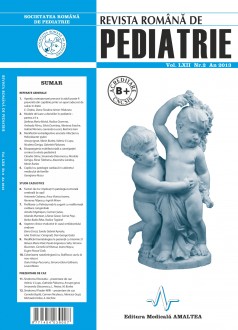SELECT ISSUE

Indexed

| |

|
|
|
| |
|
|
|

|
|
|
|
|
|
|
HIGHLIGHTS
National Awards “Science and Research”
NEW! RJP has announced the annually National Award for "Science and Research" for the best scientific articles published throughout the year in the official journal.
Read the Recommendations for the Conduct, Reporting, Editing, and Publication of Scholarly work in Medical Journals.
The published medical research literature is a global public good. Medical journal editors have a social responsibility to promote global health by publishing, whenever possible, research that furthers health worldwide.
Prophylaxis with Palivizumab in infants with congenital heart disease
Amalia Făgărăşan, Carmen Şuteu, Iolanda Muntean, Liliana Gozar, Sorina Paşc, Balás Réka Borka and Rodica Toganel
ABSTRACT
Introduction. Human respiratory syncytial virus infections in children suffering from congenital heart disease is a primary cause of cardiac decompensation, which leads to frequent and prolonged hospitalizations. We will be sharing our department’s experience with utilizing Palivizumab in newborns and infants with hemodynamically significant congenital heart diseases.
Methods. According to recommendations made by immune prophylaxis guides regarding Palivizumab, 28 children with mean age 2,6 months hospitalized in the Cardiology Clinic II- Children, of the County Emergency Clinical Hospital in Tîrgu Mureş were included in a vaccination program between October 2010 and February 2012. The administered dose was 15 mg/kg (monthly intramuscular injection). Each child treated with Palivizumab was monitored in order to establish the hospitalization rate for respiratory infections, as well as detect any adverse reactions. A control group of 28 children, with a mean age of 4,3 months, with severe CHD was selected. The rate of respiratory infections was observed. The case group was monitored for 6 months after vaccination and the rate of bronchyolitis was observed.
Results. The hospitalization rate for respiratory infection was 3,57% in the case group, and 32% in the control group. Monitoring the side effects after vaccination showed no severe adverse reactions: 19% of the children developed subfebrility and slight anxiety and 4% developed fever and diarrhea 24 hours after administration.
Conclusion. The results show a favorable response to the vaccine, with minor side effects, an absence of hemodynamic decompensation at the time of administration, as well as a reduced number of human respiratory syncytial virus infections.
Key words: congenital heart disease, Palivizumab, infant
